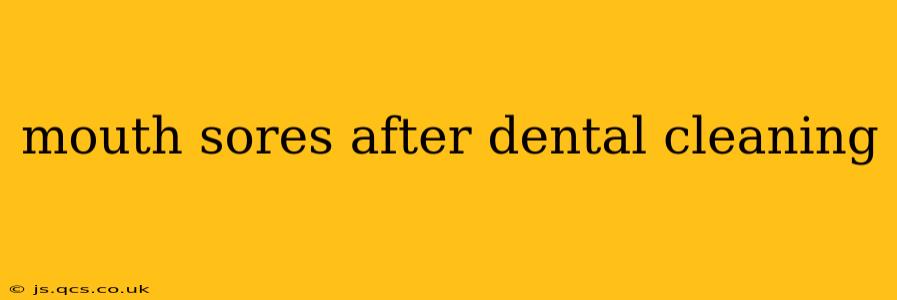A dental cleaning is generally a positive experience, leaving your teeth feeling sparkling clean and your mouth feeling refreshed. However, sometimes, a seemingly simple cleaning can lead to an unwelcome side effect: mouth sores. This can be frustrating and uncomfortable, leaving you wondering what caused it and how to treat it. This comprehensive guide explores the reasons behind mouth sores developing after a dental cleaning, offers effective treatment options, and provides valuable prevention tips.
What Causes Mouth Sores After a Dental Cleaning?
Several factors can contribute to the development of mouth sores following a dental cleaning. While it's not always directly caused by the cleaning itself, the procedure can sometimes exacerbate existing conditions or create a conducive environment for sores to form.
1. Minor Trauma: The most common culprit is minor trauma to the soft tissues in your mouth. During cleaning, the hygienist's instruments, even with gentle handling, can inadvertently scratch or irritate the gums, cheeks, or tongue. This minor injury can create a small break in the skin, making it vulnerable to infection and the formation of canker sores or aphthous ulcers.
2. Allergic Reactions: While rare, some individuals may experience an allergic reaction to certain components used during the cleaning process, such as toothpaste, fluoride, or even the materials used in the instruments. This reaction can manifest as mouth sores or other symptoms like swelling or redness.
3. Existing Conditions: Pre-existing conditions like gingivitis (gum inflammation) or periodontal disease can be aggravated by the cleaning process, leading to increased inflammation and the development of mouth sores. The cleaning itself may dislodge bacteria or debris, further irritating already sensitive tissues.
4. Dry Mouth (Xerostomia): Dry mouth, often caused by medications or underlying medical conditions, can increase the susceptibility to mouth sores. Saliva plays a crucial role in protecting the oral mucosa and maintaining a healthy oral environment. The lack of saliva can leave the mouth vulnerable to irritation and infection.
How Are Mouth Sores After Dental Cleaning Treated?
The treatment for mouth sores depends on their severity and underlying cause. In many cases, the sores heal naturally within a week or two.
1. Over-the-Counter Remedies: For minor sores, over-the-counter remedies like mouthwashes (with no alcohol), pain relievers (like ibuprofen or acetaminophen), and topical anesthetics can provide relief from pain and discomfort. Applying a small amount of Orajel or similar products can help numb the area.
2. Prescription Medications: If the sores are severe, persistent, or recurrent, your dentist may prescribe medication, such as corticosteroids or antiviral agents, to help accelerate healing and manage pain.
3. Home Remedies: Gentle rinsing with warm salt water several times a day can help keep the area clean and promote healing. Avoid harsh mouthwashes containing alcohol, as these can further irritate the sores.
How Can I Prevent Mouth Sores After a Dental Cleaning?
Prevention is key to avoiding the discomfort of mouth sores. Here are some tips to minimize your risk:
1. Proper Hydration: Staying well-hydrated helps maintain adequate saliva production, which protects your oral mucosa.
2. Gentle Brushing and Flossing: Consistent gentle brushing and flossing before and after your cleaning can help maintain good oral hygiene, reducing the likelihood of irritation.
3. Inform Your Dentist: If you have a history of mouth sores or any sensitivities, inform your dentist or hygienist beforehand. They can adjust their techniques to minimize the risk of trauma.
4. Post-Cleaning Care: Avoid extremely hot or spicy foods immediately after your cleaning, as these can irritate already sensitive tissues.
What if the Mouth Sores Don't Heal?
If mouth sores persist for more than two weeks, are severe, or accompanied by other symptoms like fever or swelling, it's crucial to seek professional medical advice from your dentist or physician. This could indicate a more serious underlying condition requiring specific treatment.
Are Mouth Sores After a Cleaning Always a Sign of Something Serious?
No, mouth sores after a dental cleaning are usually not a sign of something serious. Most often, they result from minor trauma during the procedure and heal on their own within a short time. However, persistent or severe sores warrant a visit to your dentist to rule out any underlying issues.
This information is for general knowledge and does not constitute medical advice. Always consult with a healthcare professional for any health concerns or before making any decisions related to your health or treatment.
